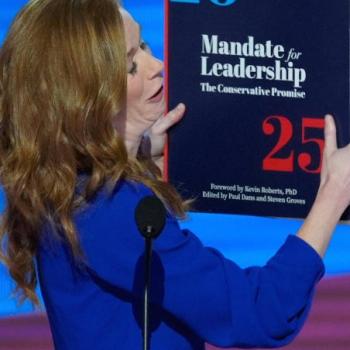So if a smoking gun fires in the woods and nobody bothers reporting on it, does it still prove the president lied?
Eight months before the U.S.-led invasion of Iraq — when President George W. Bush was still publicly saying things like "We're doing everything we can to avoid war" — Bush had already predetermined that the invasion would occur. The case for war, however, was recognized as "thin" since Saddam Hussein was not an actual threat to the U.S. or to his neighbors. The evidence regarding his weapons of mass destruction and alleged links to terrorism, the selected rationales for the invasion, would have to be "fixed" in order to justify the invasion.
That is the testimony of a top-secret memo prepared for top-ranking British officials on July 23, 2002.
The memo was made public on May 1, 2005, when it was published in the Times of London. Read the entire memo here. Some excerpts:
C reported on his recent talks in Washington. There was a perceptible shift in attitude. Military action was now seen as inevitable. Bush wanted to remove Saddam, through military action, justified by the conjunction of terrorism and WMD. But the intelligence and facts were being fixed around the policy. The NSC had no patience with the UN route, and no enthusiasm for publishing material on the Iraqi regime's record. There was little discussion in Washington of the aftermath after military action. …
The Defence Secretary said that the US had already begun "spikes of activity" to put pressure on the regime. No decisions had been taken, but he thought the most likely timing in US minds for military action to begin was January, with the timeline beginning 30 days before the US Congressional elections.
The Foreign Secretary said he would discuss this with Colin Powell this week. It seemed clear that Bush had made up his mind to take military action, even if the timing was not yet decided. But the case was thin. Saddam was not threatening his neighbours, and his WMD capability was less than that of Libya, North Korea or Iran. …
The Attorney-General said that the desire for regime change was not a legal base for military action. There were three possible legal bases: self-defence, humanitarian intervention, or UNSC authorisation. The first and second could not be the base in this case. Relying on UNSCR 1205 of three years ago would be difficult.
I don't have a scoop here. You've probably already read about this elsewhere, although probably not in an American newspaper. Nor do I have a new angle on this story or some deep new insight.
As you may have noticed, I've been a bit slacker than usual in my slacktivism of late. A big transitional project at work meant longer-than-usual hours. That was followed by a new, later late-shift, which has had me kind of jet-lagged whle making the adjustment. At the same time, I spent most of last week rehearsing and immersing in a play that I spent the weekend performing, further cutting into my time for reading and writing. And, of course, on top of all that, I'm a chronically lazy person. All of which accounts for the still inexcusable fact that I didn't post anything about this story — this huge, historic story — until 17 days after this shocking smoking gun memo was first made public.
For that I apologize, but let me also note this: The newspaper I work for has still not published a single word on this story. Nor have most American newspapers. I'm a lazy, sleep-deprived, amateur thespian, but I still managed to beat them to the punch on this one. My work-ethic as a blogger lately has been dismal, but compared to the incurious stenography that passes for professional journalism these days, I'm practically Woodward and Bernstein.
That's related to the point Will Bunch makes in this insightful rant at Attytood:
It's amazing how many journalists are OK with being deceived, as long as they don't have to offend anyone. …
Take the editors of the Washington Post. When confronted with a British government memo that showed that President Bush "fixed" the intelligence on Iraq to make the already-decided case for war, the newspaper did nothing for two weeks, then buried the story — a story that in a different era, one with more courageous leadership, might be seen as an impeachable offense — on Page A-18. Odd behavior for a business obsessed with "scoops."
And yet, with so many brave defenders of journalistic purity out there, you would think that newspaper circulation would be soaring. Instead, readership is dropping like a stone, the biggest plunge in almost 15 years. Does anyone truly believe its from a lack of "context?" Of course not.
It's from a lack of cojones, of not only not afflicting the comfortable but knuckling under the first time anyone complains.
















